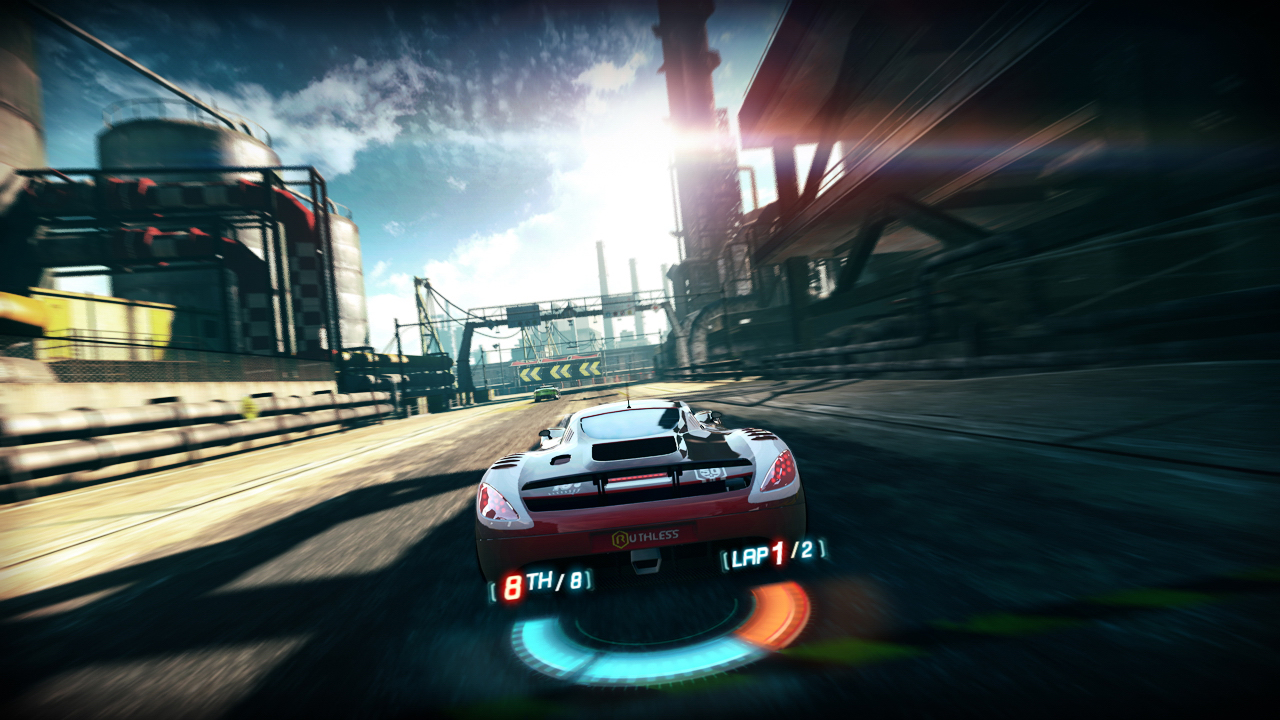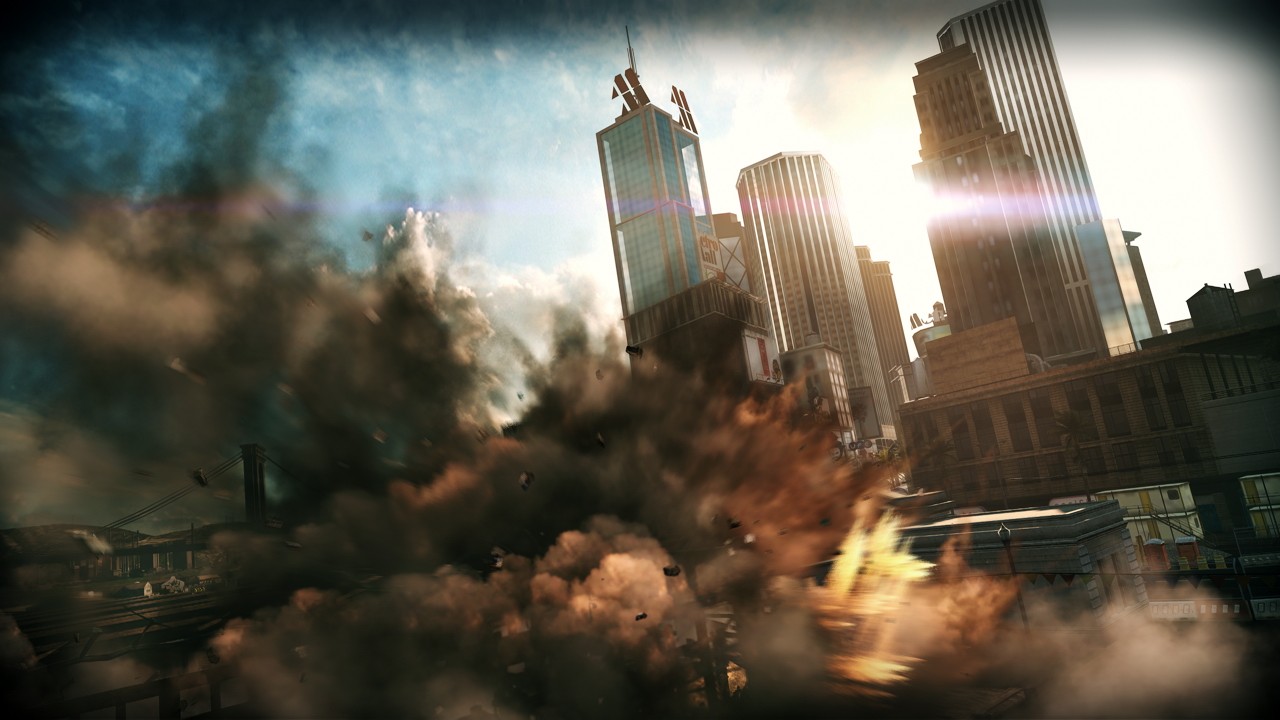When you think of a Jerry Bruckheimer or Michael Bay production, you think of big-budget, high gloss, action sequences with fast cars, multiple explosions, and plenty of hair-raising moments. Vehicles are engulfed in flames left and right flipping into the air and careening out of control; buildings collapse upon the streets, shop windows are blown out, helicopters swoop down across the road, and city centres are completely and utterly demolished amidst the chaos and destruction of this grandiose action sequence. Now, gather all of these jaw dropping elements, roll them into one package, and make them the defining feature of an intense arcade racer. That’s Split/Second in a nutshell, and it’s as crazy, exhilarating, and fun as it sounds... even if that initial excitement may not hold up in the long run.
To provide a basis and rationalise this over-the-top action, Split/Second is set up like a season of a reality TV show. The city and location of all of this destruction, is actually a gigantic set created by the minds of the show, providing the structure for the myriad carnage that appears in every race. There’s no sort of outlandish Running Man situation here, each driver is competing for the season championship with the show consisting of twelve episodes with six races in each. It’s a simple but effective setup, spreading out each race and event into bite sized chunks so you can easily go back and improve upon past results. The actual reality TV show portion doesn’t venture past its initial concept, acting as a backdrop for the action rather than any sort of narrative push. The “next time on...” videos before and after each episode are a nice touch, exemplifying the TV show premise. But they’re minimal in the grand scheme of things.

The majority of your time in Split/Second will be spent racing through this city, from the tall skyscrapers of the downtown district, to the bustling local airport, the docks, and even a giant dam not too dissimilar from Hoover’s very own. There’s a nice variety to each track and most of them will intertwine within one another to create a sense of cohesion within the city. However, what makes each track memorable and fun to play are the power plays. These packages of volatile carnage are the fuel that keeps Split/Second accelerating. As you race you’ll fill up your power play meter by performing well, whether it be drafting behind an opponent, drifting around a tight corner, or jumping over a conveniently placed ramp. Multiple actions will fill up this meter allowing you to use the environment as a lethal weapon. Split/Second will always be compared to the Burnout series because of their obvious similarities, but while Burnout is all about using your car as a weapon, Split/Second is all about the environment. As opponents move into range a target will appear and with the simple press of a button the track comes to life with explosive ferocity. Immobile cars and trucks will ignite at random, flying into the road as helicopters disperse of explosive payloads and entire buildings come crumbling down.
And they’re just the level one power plays. The meter consists of three separate bars, each one able to trigger one power play at a time. However, filling up all three will grant you the ability to unleash the grand scale devastation of the level two power plays and route changers. These will shape and deform the tracks themselves, opening up completely new paths as giant skyscrapers collapse to the ground, Boeing jets crash land right on top of you as you narrowly swoop under the wings and massive ships slide off the dock and into the water, crushing any cars unfortunate enough to be in the way. Words do not to justice to how spectacularly awesome each power play is. The sound muffles before bellowing to life as the phenomenal explosion and particle effects engulf the screen and the cacophony of the epic, techno-infused score is turned up to eleven. It’s an unadulterated attack on the senses. When you’re flying along at a hefty two-hundred miles per hour, the amount of expletive-laden amazement as you narrowly avoid an out-of-control train is unparalleled in any other genre, let alone other racers.
The problem is that the initial excitement doesn’t last forever, and the power plays eventually lose some of their edge. There’s no doubting the brilliance of seeing them for the first time and reacting to them on the fly; your first few hours with the game will be a phenomenal experience. But after you’ve seen them all, each power play becomes a strategic element rather than exhilarating eye candy. You learn to utilize specific power plays to earn the greatest effect, saving up for some of the bigger events and using them at the opportune time to wreck multiple opponents at once. It’s an evolution of play from the first few hours that goes someway to stunting the looming fear of repetition. It does eventually set in, especially later on in the career when the tracks begin to repeat themselves, but the racing mechanics are fun enough to keep things entertaining. The controls are intuitive and fairly weighty, focusing on quick movements, to avoid wrecking, and big drifting. There’s a real skill to amassing a perfect drift, and later on in the career hitting a perfect line becomes paramount to success.
Though, this is due to the rubber band AI more than anything else. Split/Second isn’t too difficult until some of the latter stages of the career, but unfair AI is a common problem throughout. It’s testament to the game’s focus on power plays that this unfair AI often occurs, since being in the lead isn’t a particularly fun experience when you can’t trigger the game’s main selling point. As a result, you’ll often find the following pack extremely close behind, often catching up six second gaps within two. Even when you know your car is much faster and you’re driving the race of your life, the AI finds a way to pass you with relative ease, performing impossibly good drifts and respawning from wrecks in the blink of an eye. Dropping from first place to fifth is such a common occurrence it would actually be quite comical if it weren’t for the frustration involved. That’s not to say Split/Second is a hard game – it’s usually pretty easy to wreck opponents with a decent power play, and you’ll normally be given ample opportunities to pass them – but the rubber band AI does cause some unwieldy races where the AI will pull ahead rather than keeping at a more realistic, surmountable distance.

Of course, these problems don’t persist once you enter the multiplayer, though this does present some of its own problems if you jump in too early. There’s no cap on the type of cars players can use, so most online races will result in a few players using the best cars in the game while the rest are in mediocre-mobiles. It’s not impossible to win, or at least finish in the top four, using a poorer vehicle, but the odds are definitely stacked against you. Most races will wind up with two or three pulling ahead while the rest of the pack are left in the dust, so it can seem very unfair and supremely frustrating. It’s probably not worth entering the multiplayer until completion of the majority of the career, so at least then you’ll have a decent arsenal of cars to choose from. Once you do, the multiplayer is an enjoyable experience that should extend the lifespan for anyone wanting to stick with Split/Second. It has the same problems as the single-player in regards to repetition, but with friends it’s suitably fun blowing each other to smithereens and progressing through the linear levelling system, even if there aren’t any rewards to gain from it.
There are also a few more game modes to try your hand at as well. Besides from a basic time-trial – which is extremely enjoyable with the addition of scripted power plays – and elimination modes, Split/Second also features three modes that feel right at home with the absurdity of the rest of the game. Air Strike and Air Revenge revolve around an evil helicopter hell bent on destroying you. You’ll need to drive fast and avoid its missile strikes to survive before Revenge lets you fire back as avoiding and drifting feels up your power play meter. Survival is just as crazy, as massive trucks unload explosive barrels into your path with points earned for overtaking. It may not have a vast amount of game modes, but the ones on offer provide a decent distraction and change of pace from the regular racing.
Though, it’s that regular racing and its penchant for power plays that will put Split/Second on the map. It may have its problems with repetition and unfair AI, but there’s no doubting the joy to be had engaging in its phenomenal action. The power plays are an inspired concept for a racing game and they’re executed to perfection with all the Hollywood gloss you would expect from a big-budget summer popcorn movie. Forget the latest first-person shooter or action-adventure, Split/Second is the biggest action game of 2010 and it’s all witnessed at two-hundred miles per hour. It doesn’t get much more thrilling.